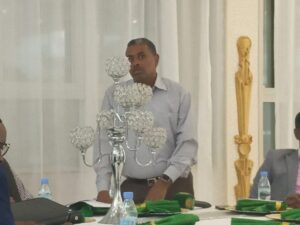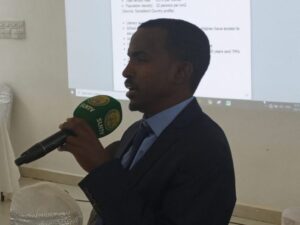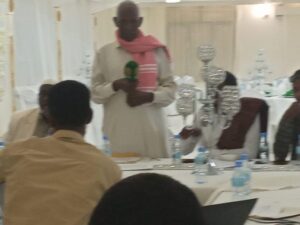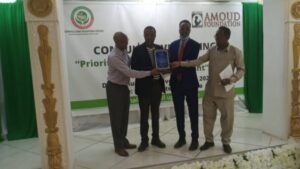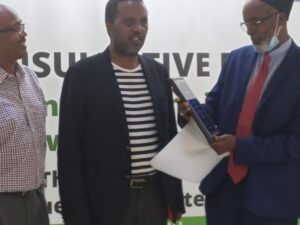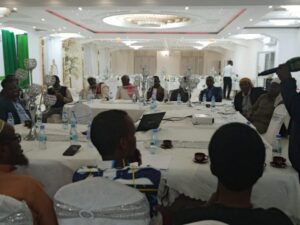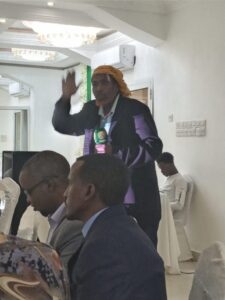The Diaspora Department under the Ministry of Foreign Affairs and International Cooperation (MoFAIC) of the Republic of Somaliland in collaboration with the Amoud Foundation held a consultative meeting on Thursday evening (25th of Nov, 2021) under the theme “Priority Investment in Education for Growth & Development”.as part Diaspora skill up initiative and towards the Diaspora transfer. The forum brought together a dedicated group of national experts including among others, educators, professors, philanthropists, public and private education institutions, researchers, development activists, volunteers, diaspora humanitarians, government officials, other professionals and academia. Somaliland is one of the least productive countries in the world whilst unemployment and poverty rates are both much higher compared even to other low income Sub-Saharan African countries. Mr. Hassan Ahmed Yusuf, Advisor to Diaspora Engagement at the MoFAIC Diaspora Department in his opening remark said, “The main goal of the consultative meeting is to assess the status and identify the weaknesses and strengths of the educational institutions, with focus on the TVET, their role and importance on the socio-economic developments, the research status and identify opportunities for creating vital partnerships and cooperation between the active diaspora groups and the local education institutions both and private stakeholders.” He added they particularly organized the consultation for Amoud Foundation to consult with expert personnel of public and private education institutions on the priority skill development for Somaliland youth to create employment and alleviate poverty in Somaliland. Sheikh Mohamud Farah Egal, President of Amoud Foundation accompanied with Abdo Dahir Aaye, Treasurer of Amoud Foundation and other members of his Team thanked the Diaspora Department for the coordination and creating useful connections for the Diaspora community willing to contribute to the development of their country, and delivered very inspiring speech. “We have been working for the social welfare development of the country and humanitarian assistance since the last twenty five years. Over the years, Amoud constructed about 500 water wells, schools, health facilities, education supplies and we bring home containers of medical supplies. We see numerous universities and yet fewer competencies of the people, less productivity and high unemployment rate in the country. Teaching you how to fish is better than giving fish to eat. We are thinking of more constructive ways to contribute to the development of this country with focus on capacity development of our people. We stay here tonight to hear from you and learn more of the situation on the ground,” said Sheikh Egal. Among the speakers was the independent senior educationist Prof. Dr. Faisal Abdi Badhaadhe who genuinely discussed the challenges in the quality of education and institutions in Somaliland in details. “I really tell you the quality education is so poor and cannot lead us to the economic growth, achieving the national development agenda and the prosperity we envision as a country if we don’t focus the problem. We as a whole nation and with the leadership of our government can collectively easily improve starting with the key areas as enrollment, retention, achievement and final destination plus curriculum development with the right and quality contents of education. The main reason is the ownership of education has been displaced. It is true that private education is more profit-oriented. The extensively increasing private schools and institutions are recruiting and taking most of the proficient teachers from the public schools and thus far their education service in quality is not matching how exactly want our children and youth are skilled,” he said. He added, swearing to Allah, I don’t mean to citizen something but we need to face the reality and actually focus on priorities in the education system of Somaliland and we can change.” The professor also highlighted that the research status of Somaliland is very low or not cared in Somaliland despite financial and capability challenges at the higher education institutions. Mr. Ahmed Aynan, Head of TVET at the Somaliland Ministry of Education & Science speaking during the meeting recounted historical background and gave overview of the current Somaliland TVET and government efforts to revive and integrate TVET in the education curriculum. Mr. Ahmed Omer Jimcale, Head of the Curriculum Section at the Curriculum Department and also Mr. Adam Yusuf, other expert at the Ministry of Education & Science gave an in-depth insight on the national policy framework and curriculum regarding TVET, the achievement and challenges. The importance of TVET in the education system. They highlighted the need to allocate more fund for TVET curriculum and enhancing the teaching capacities and skills of TVET teachers. He urged Amoud Foundation to assist the Ministry of Education & Science in the printing of a unified curriculum/syllabus for all educational institutions in the country which is currently lacking. Mr. Kamal Hassan, project manager at HAVAYCO LNGO speaking during the occasion highlighted the role an importance of TVET based skills for socioeconomic development and creation of a skilled workforce. He stated that most of the students who had acquired TVET skills are likely to get work compared to their counterparts, and further stressed the need to adapt modern skills which are in demand the digital age, and to address the problem of the mismatches in the skills learned and the market-oriented skills in demand. Finally, Mr. Kamal Hassan urged the government of Somaliland to develop and approve TVET related regulation. Similarly, Mr.
Mr. Suleiman Ahmed Hugur, representing GAVO, a local NGO briefed the participants on the TVET challenges/ constraints and the same time the opportunities and priorities in skill development. Captain Mohamed Abdi Ismail (Maykal) from the Coastal Guard briefed those attending the meeting on the importance of developing agricultural skills for the employment creation and economic growth, and utilizing the country’s untapped natural resources including fisheries and farming. He pointed out that the coastal communities are not only neglected in terms of skills but also deprived of basic services and infrastructure including water accessibility, and he called for the Government and the general public of Somaliland to consider this forgotten Gulf of Aden coast and the huge resource it is endowed with. The Somaliland Disability Organization (SOBO) attended the meeting with three committee members including their chairperson, spokesperson and secretary. Mr. Mawlid Mohamed Odowa, program producer at the Somaliland Ministry of Information discussed that the blind with visual disabilities can learn well and can work like the sighted people if they are supported with the necessary skills conforming their needs. “The biggest misconception that many people have is blind and visually impaired are not self-sufficient. In reality, we work very hard for what we want to achieve in life. Every blind and visually impaired person has a variety of goals and objectives—just like a sighted person,” he said. He added, “Students with visual disabilities succeed educationally when instruction and services are provided appropriately and are tailored to the students’ unique needs. I am producer and do my work in the best of manner with the use my laptop and applications, and I even sometimes help my sighted colleagues edit programs. Learning ICT plays vital role in the life of the blind people. Trained human resource and instructors in inclusive teaching strategies geared towards students with visual disabilities contribute to a better learning experience. Students with visual disabilities require special tools to access information both inside and outside of the classroom. This assistive technology ranges from low-tech devices such as reading magnifiers to complex high-tech Braille printer,” he suggested. In the roundtable discussion, among the notable institutions taking part were the Ministry of Education & Science TVET Dept., University of Hargeisa, Hargeisa Technical Institute, Higher Education Commission, NHPC, SOLNA, HAVAYCO, GAVO, SOBO Blind Organization, Suldaan Elmi Kabaal Foundation, Friends of The Sea, and Diaspora-led philanthropic Organizations including SIPA headed by Halimo British, Self-help Society headed Amb. Hussein Wadaadyare as well as independent scholars and experts in different fields including university lecturers or professors. At the end of the program, Amoud Foundation awarded Amb. Hussein Wadaadyare with a certificate of appreciation for his unrelenting efforts and contributions towards the charity projects mainly for his role in providing of useful medical supplies’ containers to Somaliland in cooperation with Amoud Foundation. The Meeting which lasted less than three hours time was very productive consultation, and the first of its kind held and so that some of the participants suggested coming together for such roundtable discussions more than once could be very important for the education sector.
















